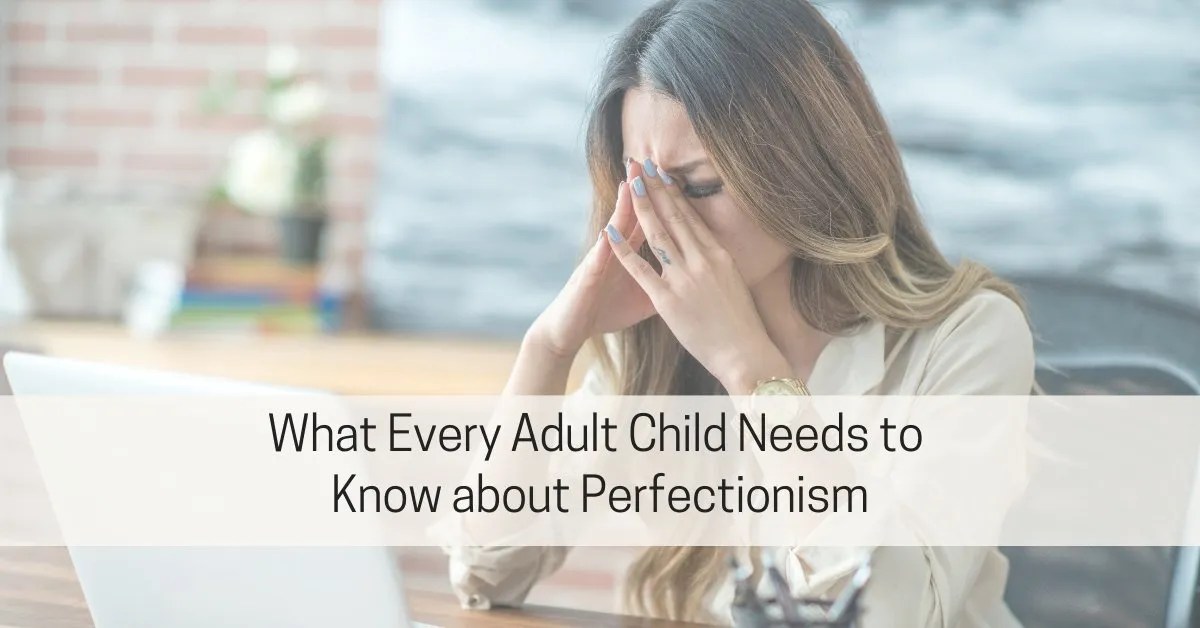If you identify as an adult child of a dysfunctional, toxic, or emotionally immature parent, you may have noticed a relentless inner pressure to do everything just right. For many, perfectionism as an adult child is a survival strategy learned in childhood.
When love, approval, or safety depended on performance, perfectionism becomes a way to cope, to feel in control, and to avoid rejection. But as an adult, these same patterns can lead to burnout, anxiety, strained relationships, and a constant feeling of never being “enough.”
In this article, we’ll explore why perfectionism develops in adult children, how it shows up in daily life, and—most importantly—what you can do to start letting go of these impossible standards and build a more compassionate relationship with yourself.
What is an “adult child”?
The term “adult child” refers to someone who grew up in a family with unhealthy behaviors and relationship dynamics, such as emotional or physical abuse, frequent conflicts, rage, inconsistent rules and boundaries, domestic abuse, substance abuse, or mental illness. These types of experiences are confusing, scary, and harmful to children. They negatively impact their social and emotional development, often leading to challenges in forming healthy relationships, managing stress, and maintaining a positive self-image that continues in adulthood.
Common Adult Child Traits
Adult children often struggle with:
- people-pleasing
- perfectionism
- fear of abandonment or rejection
- taking care of others to feel worthy
- all-or-nothing thinking
- not knowing who you are
- trying to control others
- poor boundaries
- difficulty trusting
- feeling inadequate
- “stuffing” or numb feelings
- being self-critical
- being passive or feeling guilty when you assert yourself
- difficulty relaxing and having fun
- being sensitive to criticism or rejection from others
Children cope by becoming people-pleasers
Dysfunctional homes can be unpredictable and harsh. Some children learn that the best way to cope is to become overly compliant or people-pleasers. In other words, we survive by trying to keep everyone happy and always do the “right” thing. We walk on eggshells, trying not to trigger a parent’s or sibling’s anger.
We have weak boundaries, losing our own identities as we overextend ourselves to please others and pursue goals and achievements at any cost. Throwing ourselves into work (or any pursuit) can become an escape and a way to numb feelings of anxiety or inadequacy. Excelling becomes an essential way to prove our worth and get validation.
Children cope by becoming overly responsible
Children in dysfunctional families become overly responsible out of necessity. We often become parentified, caring for our parents or siblings when we’re still children ourselves, and saddled with adult pressures and responsibilities that belong to our caregivers.
We learn early on that others are untrustworthy, and we can only rely on ourselves.
Children cope by becoming perfectionists
Children in dysfunctional families also cope by becoming perfectionists. We tried to be “good girls” or “good boys.” We thought that if we could be perfect, follow all the rules, get the best grades, make the varsity team, or win the spelling bee, we might be able to please our parents, earn their love, and get some positive attention.
Perfectionism also helps us avoid harsh criticism and unwanted attention. It’s often safest to “fly under the radar” or not draw any extra attention to yourself, because attention can quickly go sideways when a family is chaotic, dangerous, or unpredictable. So, we hope that excelling will help us avoid our parents’ anger and criticism.
Because we were blamed and criticized as children, we developed a harsh inner critic. We expect perfection from ourselves, and since this isn’t possible, we berate ourselves and feel intense guilt, shame, and hopelessness.
Perfectionism erodes our self-esteem. Because we can’t be perfect and achieve our impossibly high goals, we always feel inadequate, unlovable, or worthless. Perfectionism for an adult child is like a hamster wheel that we can’t get off—we feel lousy about ourselves, so we seek external validation, which leads to overworking, proving, and perfecting, which creates stress and ultimately leads us back to feelings of shame and failure because we couldn’t live up to our perfectionistic standards.
How to let go of perfectionism as an adult child
If you’re a perfectionist who grew up in a dysfunctional family, remember that perfectionism was a coping strategy. It was helpful when you were a child. It was the best strategy you had for dealing with the confusing, scary, harmful, and unpredictable things that happened in your home. In other words, perfectionism is an understandable and normal response to growing up in a dysfunctional family.
Now, you can ask yourself if perfectionism and self-criticism still serve you well. Or is it time to let go of perfectionism and find new coping strategies? With effort and support, you can change perfectionist thoughts and behaviors that are no longer helpful. You can begin to invite fun and self-compassion into your life. You can accept mistakes and not be so harsh with yourself.
The first step in any change process is acknowledging that perfectionism is getting in your way and is causing you pain. From here, you can set goals and take action. There is hope! And if you’re ready to change, consider getting a copy of my book: The CBT Workbook for Perfectionism.
This post contains an affiliate link, which means we may earn a small commission if you make a purchase through our links. There is no added cost for you.
Helpful Resources
©2025 Dr. Sharon Martin, LCSW. All rights reserved. Photos courtesy of Canva.com.
Learn More
Publisher: Source link






